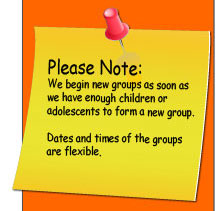| August-September 2014 - Volume 61 | |
| Helping Children and Adolescents Succeed Socially! | |
| The Social Skills Groups |
|
Healthy child and adolescent development occurs through positive self-object experiences. Healthy self-object responses are: Attuned, empathic responsiveness from the environment; the parents, family, school = the environment. This will help your children and adolescents in every way. And it will help them to make and keep friends, and to be successful in their endeavors.
According to Contemporary Self-Psychology, our role as parents should be to promote a healthy self-object experience. Healthy development occurs through self-object experience that is attuned and empathic to the developing individual. The “good enough”, “right” responsiveness to and for your child/ adolescent that is vitalizing, and will promote the development of the child/adolescent “self”. Pathology (= when things go wrong; a deviation from a normal state) (can) occurs through the breakdown of the “self-object, milieu! Yes, it is true. Breakdowns will occur resulting in many areas for the child/adolescent including:
Your self-object empathic care and support, will help them to know what to say, how to make good choices, and how to behave in all kinds of situations. Your empathic time and care will help their social skills, which present first in the home and family life. Your self-object empathic care and support will influence your children’s/adolescent’s behavior, academic performance, peer group and family relationships. Applying care and compassion to your parenting can be incredibly invaluable. The failure of parental empathy to meet the natural (yes, developmentally entitled) needs during childhood, results in the ability to develop intra-psychic structures that can reliably regulate self-esteem, calm the self (ability for the child/adolescent or person to self-sooth), leaving the person able, and not dependent, on those around them to provide those functions for them. Often enough, teens and adolescents turn to drugs and alcohol to also do it for them. (self-sooth), and to be in control of their behavior; their self-control. In addition, Anxiety Disorders are highly prevalent in too many children/adolescents in this 21st century and often coexist with depression. What can parents and the caretakers of our growing and maturing children do to achieve a healthy self-psychological approach to parenting?
Have a great school year 2014-2015. Some ideas taken from: |
| The Social Skills Place, Inc. :: 310 S. Happ Rd, Suite 201 :: Northfield, Illinois 60093 Office 847 446-7430 :: Cell 847 507-8834 :: www.socialskillsplace.com |
|
| (C) 2006-2021 :: All Rights Reserved :: Unsubscribe from our mailings |
